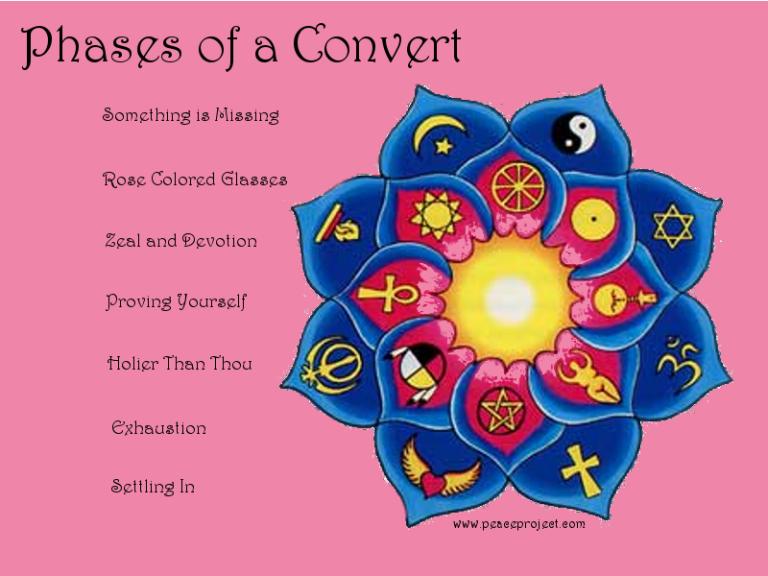I go back and forth on whether I call myself a convert, sometimes depending on the circumstance. The truth is that I am a weird hybrid where I grew up on stories from The Mahabharata, chanting Sanskrit prayers, practicing transendental meditation, and reading the Gita. At the same time, I didn’t identify those things as Hindu things. Despite all these things, I figured I was Christian because that’s what everyone else around who looked like me was. I never had a Christian worldview, as I discovered when I spend more time among actual Christians!
But even though I sometimes make the argument that I was born Hindu, I have the thoughts, fears, questions, concerns, and experiences of a convert. Because no matter what religion someone is leaving or going to, there seem to be some really universal experiences that converts have.
It seems I am not the only one who has observed that converts seem to go through some particular phases. It’s a bit like the stages of grief; stages of a convert. And like the stages of grief, one might get caught at one stage for a long time or bounce back and forth between them. It’s helpful to know about this, to see where you might be on the path. This is one reason why I dislike when people say “There’s no such thing as conversion in Hinduism, you are already Hindu.” I appreciate that sentiment, but it dismisses the unique problems that converts often face.
Here are the stages as I have observed them:
Something Is Missing
Whatever you grew up with, it just isn’t satisfying you. Maybe you feel like you didn’t grow up with anything spiritual. Maybe the rituals of your childhood feel empty and meaningless. You can’t connect with God or you just have a sense that there’s a hole in your life. (Some people have divided this part into several stages)
Rose Colored Glasses
You are introduced to a religion that seems so much better than what you grew up with. It’s the Truth, it’s perfect, why isn’t everyone doing this? Its dogma makes so much sense. The people who practice it are so holy and you know you would be too if you followed those guidelines.
Zeal and Devotion
You dive into the new religion head first. You soak up every rule and every obscure doctrine you can find. You’re relieved to have finally found something to fill that hole, to satisfy your longing. You want everyone to feel the joy that you’re feeling. You can’t understand why the whole world doesn’t practice this religion. Every new rule you take on makes you feel more holy and closer to perfection. You just know God is pleased with you. You’re making up for lost time, trying to catch up with the years you didn’t know about this path.
Proving Yourself
You’re painfully aware that you stick out. You give yourself away by messing something up or by not knowing something or just by knowing way more than a native to the religion would. Or your ethnicity is different and you look different.
You’re frustrated that you haven’t grown up with these wonderful riches and jealous of those who have, stunned that they don’t appreciate it. Why are the natives practitioners so lazy with it? Why does it seem like they’re rolling their eyes at you?
You want to prove how serious you are, how dedicated you are. You don’t want people to think or say that this is just a phase and you don’t know the reality of the religion. You wish you could fit in and be accepted fully. You want to make yourself ethnically like the natives of your religion. No matter how impossible that is, you do it anyway.
This is a time when a convert is particularly vulnerable to manipulation. In trying to prove ourselves, we’ll do almost anything to be accepted and to feel like we belong.
Holier Than Thou
You do it all. You follow every rule and can’t help but look down on those who aren’t showing the same dedication, whether natives or fellow converts. You’ve dedicated your whole life to your new religion. What else is there? Nothing matters but the goal of that religion (moksha, heaven, nirvana, enlightenment, etc.). You live it and breath it. You dress according to your religion (maybe even following rules and dress traditions that haven’t been actively practiced in centuries). You eat according to your religion. You plan your social life according to your religion.
Exhaustion
The rose colored glasses have come off. You’re starting to see the problems and issues within your new religion. You’re also run ragged from being so dedicated to every single rule and trying to show everyone else how dedicated you are. You just can’t keep it all up.
You wonder if you made a mistake. You wonder why it doesn’t feel quite as perfect as it did at first. You are disappointed in the bad behavior of some of the people who also identify as being your religion. You long for the joyous certainty of earlier stages.
Your practice dwindles from an all-or-nothing feeling that you’ve been giving so much of yourself and you completely pull back and try to find your self again. You still identify with your new religion but feel guilty about how little you’re actually practicing it.
Settling In (Or Giving Up)
This is the point where you most resemble a native. You know which parts are most important to you and which things to let go. The religion is more integrated in your life and your entire life has gone back to a balance where it’s not all religion all the time. If you still stick out you tend to just shrug and accept that you can’t control other people’s reaction to you.
Either that or you panic and think you made the wrong choice, becoming enamored of a different religion and starting the whole thing over again.
Sound familiar?
I’ve seen variations of this play out in all different types of conversion/reversion: people becoming Jewish, people becoming Christian, people becoming Muslim, people becoming Hindu, people becoming Buddhist, people becoming Pagans. It’s common for all converts to and from all religions, whether they commonly accept converts or not. Pretty remarkable, I think!
Here are some other people who have observed similar effects (and I’ve seen many more over the years, but couldn’t dig up every blog post I’ve ever read that made me think about this!)
The “SuperConvertitis” phase, where I tried to out Islam everyone else. The burnout phase, where I just wanted to not think about Islam at all, the barely doing the minimum phase where only guilt and fear of Hellfire kept me going, and the phase I’m in now. It’s kind of a comfortable phase. I’m steadfast in my faith, I know where my weaknesses are and I don’t beat myself up for them anymore, and I try to maximize my strong points. –http://www.patheos.com/blogs/
muslimahinprogress/2011/09/ why-would-i-leave-islam.html
Brian McLaren identifies four stages in the life of faith: simplicity, complexity, perplexity, and harmony. Simplicity is broadly similar to Scott Peck’s stage 2, a black-and-white simplistic approach. Complexity betokens a more mature and nuanced understanding. Perplexity is when it all stops making sense, perhaps when the complexity reaches a level that feels like chaos – Scott Peck’s stage 3. And Harmony is a fully mature, deep level of faith which can embrace paradox, mystery and uncertainty. –http://evangelicaliberal.wordpress.com/2011/01/09/ stages-of-spiritual- development/
“It’s always a battle of proofing yourself to be enough of either one. And at any given time, you’re listening to a camp that’s saying you’re not one of us, you’re one of them. Or you’re not one of them, you’re one of us. MaNishtana http://www.manishtanasmusings.com/
I wish I’d read this article, “Struggling or Suffering: My Journey as an Observant Jew”, at some point during my conversion. But I was so high on Judaism, I probably wouldn’t have given it much thought. No one warned me that at some point after your conversion, you’ve just gone so far up, the only direction you can go is…down. I wish I could say that I’m struggling and hopefully, my brave face shows that side. But sometimes, I feel like I’m just suffering. I miss parts of my life before. No, I wouldn’t trade them to be a non-Jew again. I love Judaism. –http://www.alizahausman.net/2008/12/struggling-or-suffering-jewish-life.html
I’m currently in the process of waiting for my PIO card to come, and I was so excited about it’s arrival because I thought it would be a really “desi moment” for me. Finally, another notch on my acceptance from Indians. Sometimes I feel like I’ve had to overcompensate so much in order to be accepted – to go the extra mile – because India & Indian mentality is so jai ho. From learning how to cook Indian food, wearing Indian clothes, getting to know the culture inside out, following the customs, religious customs…everything!…After 7 years of being part of an Indian family, (or 6 years of “trying” to break the brick wall and then being publicly accepted) I’m starting to wonder if I’ll always be seen as a foreigner…? –http://madh-mama.blogspot.ca/2013/07/thoughts-on-being-lifetime-foreigner.html
A lot of converts will get a lot of praise and helpful words from fellow Muslims, but there is sometimes an animosity towards converts that should be something alien to our ummah (Muslim community)—it resembles a pre-Islamic attitude of racism. As a convert, there is often a feeling of inferiority because “I’m not Arab” or “I’m not desi” that can sometimes lead the convert to acting like they are from a culture they are not, and that has nothing to do with Islam. This is something that needs to be resisted by converts who might have the urge to wear Pakistani clothes to “fit-in” around Muslims because they feel so different. –http://www.suhaibwebb.com/islam-studies/islam-101/misconceptions/8-things-you-should-understand-about-converts/
What is the most difficult thing about being a convert?
Honestly I don’t know how to peg just one thing. I suppose the easiest one to pick out is the feeling of never being completely up to snuff. At a recent Shabbat meal, we were discussing some of the bizarre traditions that it takes a while to get the hang of (let alone to seek out the origins of such things), and I quipped how for converts it’s a long and dusty trail to get all of these things down pat with full understanding and comprehension. Someone pointed out that it’s just as difficult for people who grow up Jewish or even for ba’alei teshuvah (people who don’t grow up religious but “return” to religious Judaism). It was a true enough point, but what it doesn’t account for is the fact that someone born Jewish who isn’t quite up to speed on certain customs or traditions won’t be scoffed at for his lack of knowledge. He’ll be embraced, educated, and come out all the better for it. Oftentimes a convert will be scoffed at or questioned as to where exactly they did their learning and conversion. It’s just not the same. –http://www.kvetchingeditor.com/2012/11/ask-chaviva-anything-of-observance-and.html
In one of the segments of Ask Chaviva Anything! someone asked whether I put too much emphasis on being a convert, and I said that it’s impossible, because being a ger is the very fabric of who I am. It defines my social life, my diet, my clothing, my approach to everything in life. A Jew can go “off the derech,” and we scoff and laugh and pray that they come back into the fold, no matter how nominally affiliated he or she is. But no matter how not Jewish he or she chooses to date, he or she will always be Jewish. An ancestor’s ketubah or picture of a grandparent’s grave, and matters are solidified. A convert? Well, I have a folder that holds both my Reform and my Orthodox conversion certificates. Pieces of paper signed by modern rabbis in a modern rabbinical court in an environment installed with processes and circumstance. But those papers can disappear, they can be questioned, they can be enough to cast away someone indefinitely. –http://www.kvetchingeditor.com/2011/11/gam-zu-l-i-no-longer-am-consistent.html















